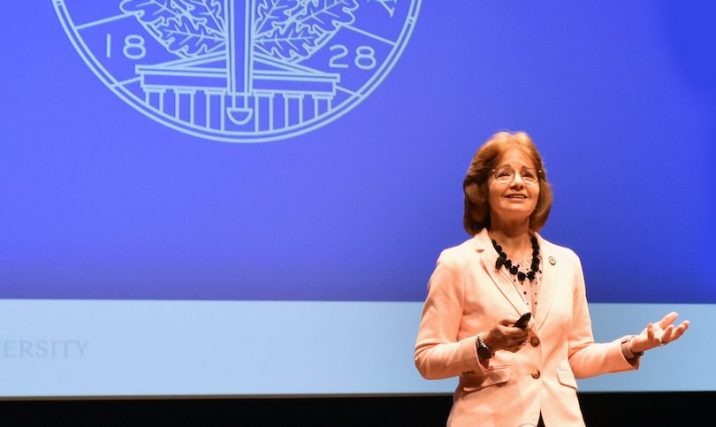Appearing as provost for the final time in a formal public setting, Dr. Gretchen Caughman virtually welcomed faculty and staff back to campus on Wednesday, Aug. 5, from the Natalie and Lansing B. Lee Jr. Auditorium.
In addressing faculty and staff along with Caughman, Augusta University President Brooks A. Keel, PhD, acknowledged the strangeness of speaking to an empty room due to social distancing. He also joked that he kept Caughman here as long as he possibly could.
Caughman will retire as provost Aug. 31. Dr. Zach Kelehear will become interim provost on Sept. 1.
On a more serious note, Keel acknowledged the challenges that will be faced as students return for the fall and reminded everyone that the No. 1 priority is patients and students.
“We know it’s going to be a challenging fall — we know that — but we are all committed to giving our students that college experience that they desire, want and deserve. And I know that you’ll work hard with me and I will work hard with you to make sure we do that,” Keel said.
Caughman began by welcoming and congratulating new faculty and leadership and congratulating current faculty who assumed new leadership roles, namely Dr. Tanya Sudia, dean of the College of Nursing; Dr. Jennifer Sullivan, interim dean of The Graduate School; Dr. Kim Davies, interim dean of the Pamplin College of Arts, Humanities and Social Sciences; Dr. Patrice Jackson, AVP of Enrollment and Student Affairs; Dr. Julie Herron, associate dean of the College of Education; and Dr. Alexis Pope, AVP of Enrollment Management.
As of Wednesday morning, Augusta University recorded enrollment of 9,415. Of those, 1,003 are new freshmen. Final enrollment figures will be released later in the fall.
“I predict (enrollment) will go up, but as we all know, it will also go down because there’s some melt along the way. But we are still accepting as well as enrolling students, so there’s more to come,” Caughman said.
She reminded faculty and staff of the impact the university has made in the fight against COVID-19, beginning with the iconic image of the virus designed by Medical College of Georgia alumna Alissa Eckert, who is now employed by the Centers for Disease Control and Prevention as a medical illustrator.
“We are contributing in many ways, many of the things that you know about already,” she said, mentioning the AU Health ExpressCare app, rapid PCR testing becoming the standard for testing around the state, medical students assisting with contact tracing, production of 3D nasal swabs and face shields, and the wealth of research around the COVID-19 disease.
She also applauded the adaptation of more than 3,600 courses to online instruction within two weeks this spring. Graduation, the first ever on a virtual platform, was a success despite its limitations. More than 400 graduates participated.
Throughout the summer, faculty and staff worked hard to meet needs that arose for some students as instruction moved online. Students who needed them were able to receive loaner laptops and were directed to areas that had good wi-fi signal. The university was also able to use more than $3 million in funds received through the CARES Act to assist more than 5,000 students who qualified.
The move to online instruction resulted in only a 1% increase in the number of withdrawals compared to the previous year, which is a positive sign of the university’s resiliency, Caughman said.
Against the backdrop of the pandemic, incidents that caught national attention were coming to light locally and at Augusta University, we understood we had work to do, she said. Listening to the AU community, chief diversity officer Tiffany Townsend developed the Equity and Inclusion strategic plan. From this, specific training will be rolled out in diversity, equity and inclusion. This commitment to diversity is outlined in detail at augusta.edu/diversity.
As for metrics, 64% of freshmen enrolled in fall 2018 progressed to sophomore by fall 2019 with a 77% retention rate.
“We’ve not really moved the needle — that is much better, but it’s really not a whole lot. So there’s still going to be work to be done,” Caughman said. “It’s not that other institutions have 100%, so don’t mistake our numbers against the others as being terrible, but they’re not where they should be. We have work we can do.”
The six-year graduation rate shows substantial progress at 46%, up from 29% for the 2007 cohort.
“Student success, as I mentioned, really is multi-factorial. It depends on so many different things. We know that it is the student, and their mindset, it is their will to succeed. But we have the obligation to support them in all the ways that we can: delivering excellent education, instructing in ways that make it accessible to those students and make it possible for them to demonstrate that they actually have gotten the knowledge,” she said.
New academic programs coming in 2020 are a Master of Science in Computer Science, Master of Science in Data Science and a Bachelor of Arts in Nonprofit Leadership & Administration.
For faculty, due to the COVID-19 pandemic, the tenure and promotion clock has been extended for a year. In addition, the provost’s task force has been developing a framework for fostering shared understanding, promoting transparency and equity, promoting alignment of faculty workload with faculty roles, strengthening accountability and processes for review, and enhancing recruitment and retention. This report will be shared within the next few months.
The full recording of the Fall Kickoff and the slidedeck presentation are available on the Provost’s website.
 Augusta University
Augusta University




